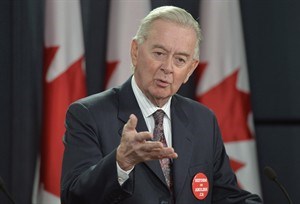
Preston Manning, former Leader of the Reform Party and CEO of the Manning Foundation Preston Manning speaks during a news conference Wednesday January 22, 2014 in Ottawa. The least costly, most efficient and effective way to reduce Canadian greenhouse gas emissions is by putting a price on carbon ??? and the provinces are best situated to make the move, says a blue-chip panel of Canadian economists which includes Manning.THE CANADIAN PRESS/Adrian Wyld
Republished April 07, 2015 - 2:15 PM
Original Publication Date April 07, 2015 - 3:05 AM
OTTAWA - The least costly, most efficient and effective way to reduce Canadian greenhouse gas emissions is by putting a price on carbon — and the provinces are best situated to make the move, says a blue-chip panel of Canadian economists.
In fact, provincial leadership is "the way forward," according to the inaugural report of the same name from Canada's Ecofiscal Commission, an independent, privately funded, non-partisan think-tank.
Perhaps most surprisingly, the study's economic modelling determined that federal co-ordination, including a common carbon price across the country, is actually the least important piece of the policy puzzle and can be negotiated down the road.
"Provinces don't have to wait for anybody, and they're not," Chris Ragan, a McGill University economist and the commission's chairman, said in an interview prior to Tuesday's release of the 53-page report.
"There is momentum. Let's build on that momentum."
It's a sunny, yet hard-headed, antidote to the current climate policy gridlock in Ottawa, where the federal Conservatives continue to rail against "job-killing carbon taxes" — despite all evidence to the contrary — while refusing to regulate the oil and gas sector.
The policy prescription comes from a commission, funded by five family foundations and two corporate sponsors, comprising 10 nationally recognized economists and backed by a cross-partisan advisory board that includes the likes of Reform party founder Preston Manning, former Alberta finance minister Jim Dinning, tax specialist Jack Mintz and Suncor CEO Steve Williams.
The commission's first report lays out in cogent detail the costs of climate inaction, the market efficiencies of carbon taxes or a cap and trade system (it declines to pick a favourite) and the benefits of "recycling" the resulting revenues in the economy.
It looks at existing carbon pricing policies in Alberta, B.C. and Quebec and assesses provincial differences in economic activity, emissions profiles and energy mixes.
"To us, the big, big argument is that provincial action is in our view the practical way to do it," said Ragan, who has served as an adviser to the governor of the Bank of Canada and at Finance Canada.
"To us it's not a political argument, it's an economic practicality argument to say: if you want to design systems that work, how would you do it best?"
Any federal government of any political stripe that hoped to impose a national carbon pricing policy "would actually confront very serious challenges," that have nothing to do with partisan rhetoric, he said.
That's in part because carbon pricing generates government revenues, which in a centralized, top-down system would presumably flow to federal coffers for redistribution — conjuring memories of the hated national energy program from the 1980s.
Any national program also must confront the regional economic complexity of the country.
"Provinces could avoid those two problems in one fell swoop," said Ragan.
Under the models used in the commission report, provinces could meet their current 2020 targets for reducing greenhouse gas emissions more efficiently by pricing carbon than through any other regulatory means.
The report supposes that all revenues generated would go to income tax reductions, although in reality provinces could use those revenues as they saw fit.
The analysis found that by pricing carbon, recycling the revenues into tax cuts, and harmonizing the carbon price across provinces and territories, the country could meet its current 2020 emissions targets while collectively enjoying a 3.7 per cent bump in GDP compared to taking a regulatory approach. Individual provinces would see higher or lower GDP gains, with the biggest relative gains going to oil-and-gas-producing jurisdictions.
Some economists have suggested a quilt of separate provincial carbon pricing systems would be an "inefficient hodgepodge," said Ragan.
What surprised the commission authors was that pricing carbon, plus recycling the revenues, accounted for most of the relative GDP gains — 3.3 per cent. Just 0.4 per cent would come from establishing a single, pan-Canadian carbon price, making it the least important element of realizing efficiency gains from carbon pricing.
"The kinds of arguments we are making need to be made by economists," said Ragan.
"The mindset out there is that you can't have a better environment without paying the economic price. I think that's wrong — if you do it right."
— Follow @BCheadle on Twitter
News from © The Canadian Press, 2015